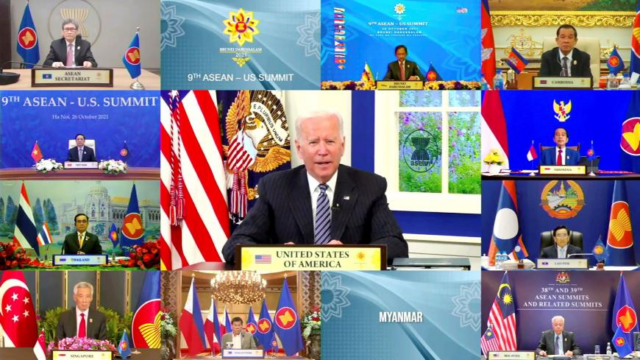US-ASEAN: Promote Rights, Democracy at Summit


United States President Joe Biden speaks in the virtual meeting of Association of Southeast Asian Nations (ASEAN) summit on Tuesday, October 26, 2021. © 2021 Brunei ASEAN Summit via AP
President Biden Should Raise Key Issues with Regional Leaders
(Washington, DC) – The United States-ASEAN Special Summit on May 12, 2022 will embolden autocratic leaders unless it directly confronts the region’s worsening environment for human rights and democracy, Human Rights Watch said today in a letter to the summit’s host, US President Joseph Biden. Leaders from the Association of Southeast Asian Nations (ASEAN) should also acknowledge the bloc’s failure to achieve progress in addressing the human rights and humanitarian crisis in Myanmar since the February 2021 military coup.
“The Biden administration will need to convince ASEAN’s autocrats at the summit that the alliance’s ultimate future depends on democratic reform,” said John Sifton, Asia advocacy director at Human Rights Watch. “The US-ASEAN relationship needs to honestly and directly address the region’s deteriorating human rights situation and democratic backsliding.”
The growth of autocratic rule in the ASEAN region is occurring amid increasing Chinese government efforts to undermine human rights protections, Human Rights Watch said.
US officials should speak openly, forthrightly, and publicly about specific concerns in bilateral meetings with ASEAN members and in statements to the media about the summit, Human Rights Watch said. The Biden administration can do so most credibly and effectively by focusing on factual situations in each country, while acknowledging the many deficiencies in the US rights record and the US government’s efforts and challenges in taking corrective actions to address them.
Human rights abuses have increased in ASEAN countries in recent years, Human Rights Watch said. The Myanmar military has committed mass atrocities against Rohingya Muslims and other ethnic groups, and anti-coup demonstrators. Outgoing Philippine President Rodrigo Duterte’s “war on drugs” has resulted in thousands of extrajudicial executions. The one-party Vietnamese government has intensified an ongoing crackdown and imprisoned over 150 dissidents. The Cambodian authorities are conducting mass trials, many in absentia, of opposition political figures.
The US should press ASEAN members to abandon their failed “five point consensus” approach to Myanmar’s crisis. Like-minded ASEAN members, including Malaysia, Indonesia, and Singapore, should join a coordinated international effort to steer the junta toward reform, including increasing restrictions on its foreign currency revenues and weapons purchases. The US and these ASEAN countries should develop a clear, time-bound approach to pressure the junta to end its abuses, including signaling support for additional sanctions on oil and gas revenues and a Security Council resolution instituting a global arms embargo.
“Discussing regional human rights concerns at the US-ASEAN summit will send the message that human rights and the promotion of democracy are critical in forging a multilateral response to the Chinese government’s assaults on the international human rights system,” Sifton said.

